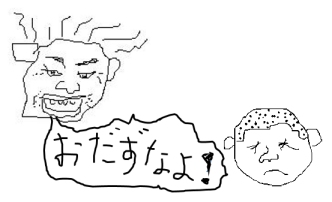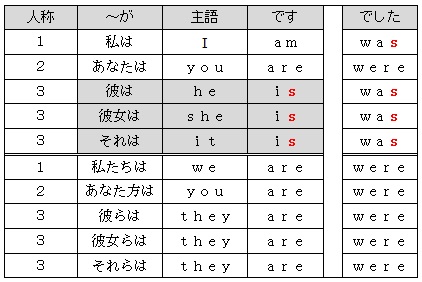受動態の文

いたずらをしたり悪のりし過ぎたりしていると,父親から 「 おだずなよ 」 とよく怒られたものです。
「 おだずなよ 」 とは宮城県などで広く使われることばで,「 いい加減にしなさい 」 というニュアンスを伝えることばです。
私が生まれたのは栗原郡若柳町(現宮城県栗原市)ですが,美しいことばがたくさんありました。
あっ,「めほだれ」 付いでだ ⇒ あっ,「目穂垂れ」 付いてる ⇒ あっ,「目やに」 付いてる
あんだのごど 「あんつこと」 してだよ ⇒ あなたのことを 「案ずること」 してだよ ⇒ あなたのこと 「 心配」していたんだよ
今日は誰もいねっか 「とぜん」 だでば ⇒ 今日は誰もいないから 「徒然」 です ⇒ 今日は誰もいないので 「寂しい」 です
ほんの一例を紹介しました。
「方言」 と言われることばには,由緒正しいことばから転じて使われているものがたくさんあります。
「方言」 の話はこれくらいにして,そろそろ受動態の勉強を始めましょう。
受動態とは
上の絵を説明するのに2通りの方法があります。
父親の側から言うと,「 息子を叱る 」
息子の側から言うと,「 父に叱られる 」
このように,動作を受ける側に目を向けて 「 ~される 」 という文を 〔 受動態=受け身 〕 といいます。
逆に,動作を及ぼす側中心で 「 ~する 」 という文を 〔 能動態 〕 といいます。
ひとつのことがらでも,目を向ける方向によって二つの言い表し方ができるのです。
ここでは,「 息子は親父に叱られる 」 という 受動態 ( 受け身 ) の文について勉強していきます。
受動態-ワンポイント・アドバイス
受動態は難しいと感じている人が多いようですが,そんなことはありません。
① 動詞の形 【 be動詞+過去分詞 】 をきちんと押さえよう。
② 過去分詞は繰り返し調べて覚えよう。特に,be動詞 【 are,is/was,were】 の使い方を再確認することが大事です。
現在の文では 【 am,are,is 】 を,過去の文では 【 was,were 】 を,使い分けられればOKです。
③ 質の高い受動態の英文にたくさん触れよう。「分からないときは,不規則動詞変化表ですぐ調べよう。繰り返し調べているうちに自然に覚えるよ」 と話し,心理的な負担を取り除いてやりましょう。
受動態を使った英文は,具体的な事実を述べた英語らしい表現がたくさんあります。英語を学ぶ楽しさや手応えを味わう格好の素材です。ウェブ上でちょっと検索して行き当たった英文を下に紹介します。
① Pumpkin seeds are planted in late spring. Field pumpkins are used for decorative purposes during Halloween.
② Electricity has been used by people for just over 100 years.
③ Christmas is cerebrated in Japan. It's a fancy event. Although, it's not related to Japanese religion at all.
④ The Japanese manga sold in Singapore is twice the price it is sold in Japan.
① カボチャの種は春遅く蒔かれます。野生のカボチャはハロウィーンの期間は装飾的な目的で使われます。
② 電気はわずか100年ちょっとの間人々によって使われています(使われているに過ぎません)。
③ クリスマスは日本で祝われます。それは夢のあるイベントです。しかし,日本の宗教にはまったく関係ありません。
④ シンガポールで売られている日本のマンガは日本で売られている値段の2倍です。
受動態の形は 【 be動詞+過去分詞 】 である
まず,受動態の基礎基本を確認しましょう。1.受動態は 【 be 動詞 + 過去分詞 】 の形が基本です。
2.「~によって」は 「 by ~ 」 で表します。
3.過去分詞は,教科書の後の不規則動詞変化表で調べよう。
・過去分詞は,主語が何であっても,常にかたちが一定です。
・規則動詞の過去分詞は,過去形とかたちが同じで -ed で終わります。
まず,be動詞の復習から
英語の基本はどこまでいっても,【 be動詞 】 です。
ときどき,下の表を,何も見ないでノートにまとめてみるといいですね。

受動態の文に慣れよう
次の①~⑮の受動態の文を日本語に直そう。
①~⑧は現在の文(~される)の文です。
① This monitor is used by us everyday.
② This CD player is used by us everyday.
③ Textbooks are read by us everyday.
④ Desks are used by us everyday.
⑤ Our classroom is cleaned by us everyday.
⑥ Date Mikio and Tomizawa Takeshi are loved by many people.
⑦ Yosakoi is danced in Kochi every year.
⑧ Ise Jingu is visited by many people every year.
⑨~⑮は過去の文(~された)の文です。
⑨ This desk was used by Shota last week.
⑩ This racket was used by Osaka Naomi.
⑪ This picture was painted by Kishida Ryusei.
⑫ The song was sung by Ikimonogakari.
⑬ Japanese was taught by Ms. Suzuki last year.
⑭ These chairs were made by students.
【 英文の意味 】
① このモニターは毎日私たちによって使われます。 ② このCDプレーヤーは毎日私たちによって使われます。
③ 教科書は毎日私たちによって読まれます。 ④ 机は毎日私たちによって使われます。
⑤ 私たちの教室は毎日私たちによって掃除されます。 ⑥ 伊達みきおと富澤たけしは多くの人々から愛されています。
⑦ よさこいは毎年高知で踊られます。 ⑧ 伊勢神宮は毎年多くの人々によって訪れられます。
⑨ この机は先週翔太によって使われました。 ⑩ このラケットは大坂なおみによって使われました。
⑪ この絵は岸田劉生によって描かれました。 ⑫ その歌はいきものがかりによって歌われました。
⑬ 国語は去年鈴木先生によって教えられました。 ⑭ これらのイスは生徒たちによってつくられました。
受動態の文をつくってみよう
それぞれ( )内の動詞を使って受動態の文(すべて現在形で)を完成しなさい。
① A mouse ( )( ) by a cat. (eat)
② Tractors ( )( ) by farmers. (use)
③ English ( )( ) in Australia. (speak)
④ Sick people ( )( ) by doctors. (help)
⑤ These vegetables ( )( ) by these students. (grow)
【 答え 】
① is eaten ② are used ③ is spoken ④ are helped ⑤ are grown
受動態の文-生徒自己表現
1995年の名取市立第一中学校の3年生による17の作品を紹介します。
英語の授業で考えたこと,学校生活の中で考えたこと,生徒はさまざま思いを受動態に託して表現しています。
なんとなく時代の空気が伝わってきます。
久し振りに読み返すと,「こんな作品を書いていたんだ。子どもたちって,凄いな」 とあらためて感じます。
① English is spoken in Canada. Not only English but also French is spoken in the state of Quebec in Canada. Because Quebec was put under the control of France in the past.
② English is spoken in the United States. French is spoken in France. Japanese is spoken in Japan. The world has many languages. That's wonderful!
③ A: Nara is visited by many foreign people.
B: There are many places to see in Nara, aren't there?
A: For example, there are Toudaiji and Houryuji.
B: Houryji is the oldest building made of wood in the world.
A: That's great. I want to go to Nara some day.
④ I like baseball very much. My favorite team is TOKYO YOMIURI GIANTS. Mr. Kawahara is a very good looking man, and he is loved by me. He is a nice pitcher, but he isn't as famous as Mr. Nomo.
⑤ I can listen to a lot of music on the radio. I think listening to music makes a person broad minded. Music is loved by many people.
⑥ Stars are shining in the sky. The stars can be seen at night. I like to watch stars.
⑦ N: Where was the SMAP concert held on August tenth?
S: It was held at Sendai Sun Plaza.
N: What time did you get home then?
S: Let me see.... It's a secret!
⑧ A lot of jobs are done by computers. A lot of jobs are far beyond human power. I am so excited at the thought of it.
⑨ The earth was made by the universe, and the sea was made by the earth. We were born in the sea. I think it's important to protect the sea and the earth.
⑩ Breaking nature is becoming a big problem now. The earth is hurt by us. So we must protect the earth more carefully.
⑪ A long time ago black people were discriminated racially by white people, and at last black people stood up in the Civil War. Black people won and they got liberty and pride.
⑫ "Anne of Green gables" was written by Lucy Montgomery. "Remember, true friends are always together in spirit" was spoken by Anne. I like these words very much.
⑬ I think courtesy is important to our life. One teacher said to me,"A man is grown by courtesy." I will never forget the words that teacher said to me then.
⑭ I was helped by my mother ten years ago, but I am helping my mother now. Thank you for your help, Mother.
⑮ She is liked by everyone, because she is kind to old people. I want to be a person like her.
⑯ I was bitten by a cat when I was a child, so I don't like cats. I like dogs much better than cats.
THE TULIPS OF HOLLAND
次の英文の日本語訳に挑戦しよう。
① Canals are found everywhere in Holland.
② Windmills are seen everywhere in Holland.
③ Tulips are seen everywhere in Holland.
④ A great many tulips are planted in Holland.
⑤ They are produced for exporting.
⑥ Many tulips are cut in the morning.
⑦ They are sent to England, France, and many other countries.
⑧ I hear that the first tulip was planted in Turkey.
⑨ The Turkish tulips were brought to Europe in 1554.
⑩ Now a great many beautiful tulips, with canals and windmills, can be seen in Holland.
tulip:チューリップ /Holland:オランダ / canal:運河 / find:見つける
everywhere:いたる所に / windmill:風車(風+ひき臼)/ plant:植える
produce:生産する / export:輸出する / send:送る / I hear:~と言われている
Turkey:トルコ / Turkish:トルコの / bring:持ち込む
答え
① 運河はオランダのいたるところで見られます。
② 風車はオランダのいたるところで見られます。
③ チューリップはオランダのいたるところで見られます。
④ たくさんチューリップがオランダで栽培されています。
⑤ それらは輸出するために生産されています。
⑥ たくさんのチューリップが朝切られます。
⑦ それらはイギリスやフランス,ほかのたくさんの国々に送られます。
⑧ 最初のチューリップはトルコで栽培されていたそうです。
⑨ トルコのチューリップは1554年にヨーロッパに持ち込まれました。
⑩ 今,非常にたくさんの美しいチューリップが,運河や風車と一緒に,オランダで見られます。